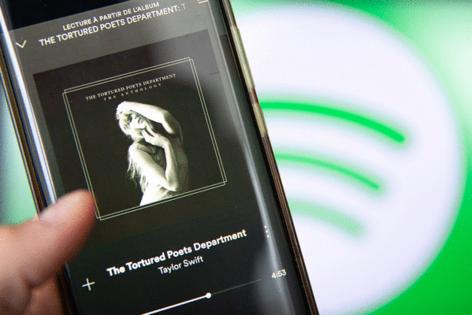Jessica Karl: Taylor Swift is proof that how we critique music is broken
Published in Entertainment News
The way we digest new music needs to be fixed.
Within less than 24 hours of Taylor Swift’s release of "The Tortured Poets Department" and her surprise anthology, the internet was flooded with an inescapable number of reviews. In the New York Times, Lindsay Zoladz said Swift’s 11th LP is “sprawling and often self-indulgent” and “full of detailed, referential lyrics that her fans will delight in decoding.” But as a long-time admirer of Swift, I have to ask: Where’s the “delight” in staying up until dawn to finish listening to an album as if it’s a college paper we’re cramming to complete by the morning?
And it’s not only the professionals causing the shift. Review culture goes far beyond opinions from music critics now. In the age of half-baked hot takes on online forums, anyone with a smartphone can word-vomit their thoughts into the ether. Many hope they get picked up by the algorithm. To avoid spoilers, fans (or just curious listeners) either have to shun media entirely or digest new music immediately — which is like inhaling a whole cheeseburger in one bite. There’s no chance to savor it. No time to even taste it. And quite frankly, it’s exhausting.
Of course, Swift’s “surprise” anthology — an extra 15 songs that dropped at 2 a.m. ET on Friday — complicates things for critics on a deadline. But the reviews arrived the same day regardless of any all-nighters. While some were well-considered (Variety’s Chris Willman said it “feels like it comes the closest of any of her 11 original albums to just drilling a tube directly into her brain and letting listeners mainline what comes out.”), others felt prewritten and daft.
An anonymous staff writer for Paste Magazine — whose byline was excluded for “safety” reasons — began the publication’s review with the jab that “Sylvia Plath did not stick her head in an oven for this!” It took nearly 700 words to get to the substance of the album itself. If you’re willing to launch a litany of petty, exclamation-pointed digs at an artist — “2013 called and it wants it capricious, suburban girl-who-is-taking-a-gap-year wig back!”— at least have the decency to put your name on it.
In the Atlantic, Spencer Kornhaber said Swift is “having quality-control issues,” echoing other publications like the New York Times, which said that Swift “could use an editor.” But consider the irony of saying that in a review that was released not 12 hours after the album. Likewise, Rolling Stone’s Rob Sheffield labeled it an “INSTANT CLASSIC” and called it “wildly ambitious.” You’re telling me you’ve fully digested a two-hour double album of 31 songs in that amount of time? Such quick determinations discredit the nature of both plaudits and criticisms.
But perhaps these critics are merely trying to join the conversation faster in order to satiate Swift’s voracious fandom, which has grown to gargantuan levels in recent years. During the first go-round of listening to the songs on her new album, a considerable subset of her fans no longer just sit around idly. They come armed with theories, ready to screenshot lyrics that they believe answer their burning questions: Who is this song about? Does that verse link up to another from a different album? Did Jack Antonoff or Aaron Dessner do a better job producing? Is the typewriter mentioned in the album’s title track referring to the same typewriter of a popular love interest?
These questions are no doubt a product of the parasocial relationship Swift has built with her audience. But are we going too far with the ex-boyfriend lore? It’s no longer just amateur sleuths trying to deduce clues. Reputable publications, from Time magazine to The Philadelphia Inquirer, engage in the guessing games as well. While I’m all for a good meme, the harebrained inquiries into Swift’s romantic life and the quick-fire answers to them in text chains, articles and tweets — “It’s about Matty Healy! Wait, it could be Harry Styles! No, it’s clearly Travis Kelce!” — cheapen the listening experience and discount the nuance of the music itself.
We wouldn’t treat poetry this way. Regardless of whether you think Swift is a modern-day Shakespeare, we shouldn’t treat music this way, either. If you’re a fan of an artist — Taylor Swift or otherwise — do yourself a favor and skip the initial slew of garbage takes, both on social media and in the news. Not only are they a disservice to the artist, they hurt our ability to actually revel in the ambiguity of it all.
Let yourself marinate in the music! Listen to it in the shower. On a long drive. In line to get coffee. While you’re doing dishes. Figure out whether you like it or hate it. After all, that’s what really matters.
———
This column does not necessarily reflect the opinion of the editorial board or Bloomberg LP and its owners.
Jessica Karl is a Bloomberg Opinion columnist and author of the Bloomberg Opinion Today newsletter.
©2024 Bloomberg L.P. Visit bloomberg.com/opinion. Distributed by Tribune Content Agency, LLC.







Comments